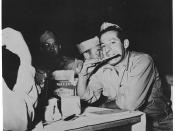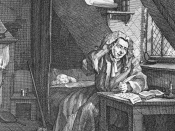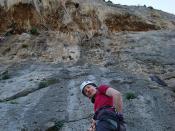In Owen?s poem, ?Strange Meeting,? the theme of war is heavily emphasized, as the poet expresses complete disgust concerning the nature of war. Yet, rather than describing the violence of war in the battlefield, the poet chooses a most unconventional route to attack war by instead placing the soldiers in Hell, centering the poem around the civil conversation between two dead enemies. In doing this, the poet strips away the barrier between these two enemies, and as a result, he evokes not anger, but pity, compassion, and regret for both soldiers. By juxtaposing the tranquility of peace and the violent imagery of war and using precise diction and irony, the poet emphasizes the cruel, destructive pain war inflicts on mankind, as neither soldier triumphs but lies helpless in Hell because of his involvement in the war.
In order to effectively draw sympathy for the soldiers, the poet first sets the tone of the poem.
Rather than using rhyme or a distinct rhyme, he relies instead on diction to set the somber, regretful tone of the poem. He describes the narrator?s setting in the first stanzas as a ?dull tunnel? (2) toward the ?sullen hall? of Hell (9-10), and one can almost feel the heaviness of the ?granites? of the earth which ?titanic war had groined? (3) as the narrator travels deeper into the tunnel. Moreover, the poet uses phrases such as ?encumbered sleepers groaned? (4), adding to the soporific, death-like setting. By depicting Hell not as the traditional fiery pit of destruction but as a mind-numbing plain of existence, notably bereft of any strong feelings or emotions, the poet firmly establishes a setting to draw pity for the characters in the poem, rather than anger.
Then, in stark contrast to the numbness in Hell, the poet moves on to convey the pain and regret of war using horrific imagery. Yet instead of anger, the poet evokes pain as a humanizing quality, and the reader cannot help but feel sorry for the second soldier. For example, the poet uses the metaphor of the carnal, vicious ?swiftness of the tigress?(28) to describe the violent attacks during the war, while the very picture of the second soldier?s face, ?grained? with ?a thousand pains? (11) stirs up much pity. Both these images serve to show the raw carnage of war and the ruthlessness of its attack on man. Moreover, this carnal ruthlessness is emphasized further, when the poet states that war distills ?pity? (25), for here the poet illustrates how war strips away man?s ability to reason and be compassionate. He also uses the terrible image of a dirty wound to describe war itself, for in the eyes of the poet, war serves only purpose: to mar mankind?s existence. To the poet, nothing is more painful or dirty that the ?cess of war? (38). As the second soldier bemoans his participation in the tragedy of war, he describes the ?blood? that ?clogged their chariot-wheels? (34); both literally and metaphorically, the soldier alludes to his regret for adding to war, now that he was aware of the ugliness of it. Thus when the soldier states that ?the foreheads of men have bled where no wounds were,? he truly expresses his disgust at the ugliness of war and its ability to taint the souls of men. Using all these images, the poet highlights the raw pain of war and evokes sympathy for both soldiers.
The poet also draws sympathy by juxtaposing these violent, stirring images with the tranquility of peace the soldiers would have had without the war. The soldier regretfully tells the narrator that he ?went hunting wild / After the wildest beauty in the world,? and that he had ?courage? and ?mystery? (30) and ?wisdom? (31); yet he lost all these things in his life when he died in the war. This pain and regret is only heightened by the helplessness the soldier feels, for he knows that the war will continue. He tells the narrator that ?men will go content with what we spoiled,/ or discontent, boil bloody, and be spilled? (26-27). Although the soldier knows the truth about war, he knows mankind will continue to fight wars. He cannot help but feel helpless because he cannot tell his comrades the truth because he is dead; the truth remains ?untold? (24), and it is this helplessness that effectively shows how war strips men of any control over their lives. By emphasizing the soldier?s loss of control over his life as a result of war, the poet effectively shows how war amounts to nothing but destruction and the participants only suffer in helpless regret.
The poet?s most effective method of illustrating the universal destructive nature of war comes in the final stanza in a clever twist of irony. It is important to note that poet does not reveal the identity of the second soldier until the very end of the poem; instead he leads the reader to believe that the narrator meets his fellow comrade in arms by using sympathetic language. For example, the narrator first sees the second soldier ?with piteous recognition? (7), drawing instant sorrow for the second soldier?s situation in Hell. Moreover, the narrator?s first words are ?Strange friend? (14), which convinces the reader that these two men are friends. This decision allows the poet to effectively build sympathy for the second solider as he describes the pain the man suffered in war. It is only after firmly establishing sympathy for the second soldier by vividly describing his pain that the poet reveals the identity of the second soldier: the enemy the narrator killed on earth; the second soldier ironically states, ?I am the enemy you killed, my friend? (40).
This irony serves only to heighten the cruelty of war, for the second soldier?s identity as the enemy does not lessen the pain he suffered in war, and in fact places the narrator in exactly the same position. The new revelation bring new meaning to the earlier words of the second soldier, ?Whatever hope is yours,/ Was my life also? (16-17), for by making the two men converse as friends when they were really enemies in life, the poet emphasizes that the pain is universal for both sides. By allowing the second soldier to speak before revealing his identity, the poet provides a venue to explore the enemy?s point of view of the war, thereby drawing sympathy for both soldiers. It is also significant that both men are in Hell, for both meet the same fate as a consequence for their involvement in the war, solidifying the poet?s lament that war ends only in destruction. Neither man enjoys the sweetness of Heaven, and instead both men are condemned for slaughtering others, giving the poem a sense of regret and bitterness. Thus by the second soldier?s ?dead smile,? the narrator knows they ?stood in Hell? (5), for he knows that they must be held accountable for their sins. Thus the poet dispels the myth that war is glorious, and he paints an ironic picture of two enemies commiserating in Hell as a result of war. By focusing on the victimization of both men, the poet effectively attacks the nature of war.
Clearly the poet takes an anti-war stance in the poem, for he builds sympathy for the enemy and the narrator. In doing this, he takes out all the strong emotions of anger and hate, for in Hell, there are no enemy lines. Both men suffer side by side, regardless of the opposite sides they took in life. Thus the poet focuses on the pain, regret, and helpless the men feel, thereby attacking the ruthlessness of war; in the end the soldiers lie helpless in Hell, enduring an eternity of regret that they even entered the war. Ironically it is also only in death that they find some peace, for there is no war in Hell; they finally find rest as the enemy?s last word reverberate with emotion: ?Let us sleep now?.? (45). Thus the poet leaves the two men finally at rest in Hell, pathetic casualties lying as a reminder of a ruthless war.




